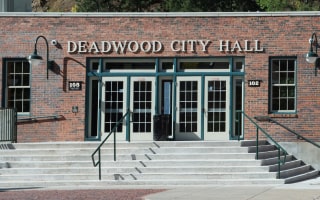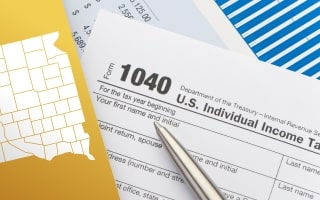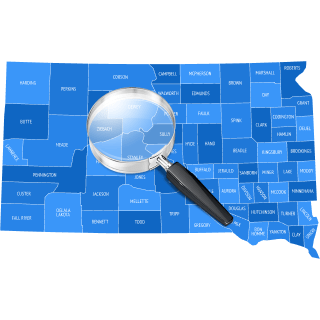Property Tax Records in South Dakota

If you're in the market to buy a home or rental building in South Dakota, you should estimate what your annual South Dakota property taxes will amount to. Every property owner in South Dakota is required to pay property taxes. The average property tax rate in the state is around 1.08%, which is just above the 0.99% national average, though with low real estate prices, buyers still find South Dakota favorable.
South Dakota tax rates can vary from county to county. In Lincoln County, the effective tax rate is 1.48%. In comparison, the effective tax rate is just 0.90% in Custer County. Your annual property taxes depend on the value of your home, which is estimated by your county's director of equalization every year. If your home increases in value from year to year, you'll pay more in taxes.
You'll receive your annual property tax bill in January. While taxes are due on January 1, you'll have until April 30 to pay the first half of these taxes without penalty. As for the second half of your taxes, they must be paid by October 31.
In South Dakota, property tax laws have been changed and updated numerous times over the past century. During the 1930s, the state legislature briefly adopted an income tax to provide homeowners with some relief from property taxes. The personal property tax would eventually be repealed in 1978. Since that time, the government has provided additional relief to reduce the amount of property taxes people pay on real estate.
Property Tax Assessment in South Dakota

If you purchase real estate in South Dakota, you'll receive a property tax bill from your county. However, the specific tax rate that's applied to the value of your home depends on the taxes that are levied by the authorities within your county. Property taxes can be levied by water districts, counties, townships, cities, and school districts. Luckily, whether you live in Brookings County or Pennington County, property taxes in South Dakota are more than affordable.
Your annual tax bill depends on your home's current market value. This value is calculated by the director of equalization in your county every year. The tax rate for your home will be equal to the total for all district tax rates in your county.
South Dakota has a somewhat unique law that allows owner-occupied residences to obtain a reduced tax rate compared to other property types. If you own and live in a South Dakota home, you can apply for the owner-occupied classification. You only need to submit this application once to gain access to the classification for each future property tax bill. The purpose of this classification is to reduce the property taxes that are charged by the local school district.
Tax rates throughout South Dakota are shown as mills. One mill equals one-tenth of a percent, which means that every $1,000 in property value equals $1 in taxes. In South Dakota, your property taxes are calculated by obtaining your home's assessed value. The assessment ratio in the state is 85%.
Let's say that you own a $200,000 home in South Dakota. Its assessed value will be $170,000. The counties throughout the state are only allowed to charge a maximum of 12 mills for property taxes. If you live in a county with a mill rate of 10, your annual tax bill will be $1,850.
You can also estimate your property taxes by considering your county's effective tax rate. If you live in Fall River County, the effective tax rate is 1.34%. To make this calculation, you need to multiply 1.34% by the full market value, which is $200,000. Your annual tax bill will amount to $2,680. The average tax rates in the most populous South Dakota counties are:
- Minnehaha County: 1.40%
- Pennington County: 1.35%
- Lincoln County: 1.48%
- Brown County: 1.34%
- Brookings County: 1.30%
Calculate South Dakota Taxes
Using a South Dakota property tax calculator is a smart way to gain a clearer understanding of how property taxes are determined across the state. This tool allows both homeowners and real estate investors to input key property details, such as location, market value, and property classification, to estimate their annual tax assessment and liability. In South Dakota, property is assessed at its full market value, and tax rates are determined by local counties, municipalities, and school districts, resulting in varying rates across the state.
A South Dakota property tax calculator also helps identify potential exemptions and tax relief programs that can reduce your tax burden. Homeowners may qualify for the Owner-Occupied Classification, which provides a reduced mill levy for primary residences. Additional relief programs include the Sales and Property Tax Refund Program for low-income seniors and disabled individuals, and the Property Tax Reduction Program for Seniors and Disabled Citizens, which offers additional assistance based on income and age. The calculator is a helpful tool for estimating these benefits and managing your tax responsibilities more effectively.
using our property tax calculator.
South Dakota Property Tax Records: What Are They?

When you pay your property taxes each year, the money will be collected by your county. Keep in mind that property taxes in South Dakota are used as the main source of funding for counties, municipalities, and school systems. Some of the revenues also go to fire departments and public services.
If you want to know more about a home that you're interested in buying, consider searching for South Dakota property tax records. These records include a considerable amount of publicly available info. For example, the report you access should include information about recent renovations that were made to the property.
Once you reach the website for the Director of Equalization in your county, you can search for South Dakota property tax records. These records should contain the following details:
-
Property address
-
Owner name
-
Assessed value
-
Parcel ID
-
Legal description
-
Exemptions
-
Utilities
-
Access road
-
Assessment value history
-
Building permits
-
Previous sales info
-
Year built
-
Square footage
-
Condition
Property Tax Exemptions and Deductions in South Dakota

In South Dakota, you can qualify for a tax relief program if you own and occupy a home. This program applies to single-family dwellings. If your home has this classification, your property taxes could be reduced by anywhere from 20%-30%. There are also a handful of tax exemptions and assessment freezes that some South Dakota homeowners qualify for. These South Dakota property tax exemptions are detailed below:
Property Tax Refund for Seniors and Disabled Individuals: If you qualify for this program, you'll receive an annual refund that covers your entire property tax bill. To qualify, you must be disabled or at least 65 years old. The income limit for this refund is $16,038 for single-member households and $21,692 for multi-member households.
Assessment Freeze for the Elderly and Disabled Individuals: If your household earns less than $51,801, you may qualify for an assessment freeze, which means that your property taxes won't increase while the freeze is in effect. This tax break is available to disabled individuals and seniors who are at least 65 years old. To qualify, your home's market value can't be higher than $345,340.
Homestead Exemption: If you make less than $21,740 in a multi-member household or $17,392 in a single-member household, you might qualify for this exemption. However, it's only available to homeowners who are at least 70 years old. It effectively delays property tax payments until the home is sold.
Exemption for Paraplegic and Disabled Veterans: Paraplegic veterans are exempt from paying property taxes if they meet certain income limits. Disabled veterans are able to exempt $200,000 of their home's assessed value from property taxes.
Tax Reduction for Paraplegic Individuals: This tax reduction is available to many paraplegics who live in South Dakota. If you meet the income requirements, your property taxes will be reduced with a graduated scale that's based on income. For example, if you're part of a single-member household and earn less than $15,218, you won't need to pay property taxes.
How To Search Property Tax Records in South Dakota

If you're looking for property tax records on a specific home, you have a few options at your disposal. You can use your county's database to access this information. In most counties, tax record searches are available online through the County Equalization Department's website. Once you enter this website, you'll be able to conduct a property search with information like the owner's name, address, or property identifier.
You can also view these records by searching for them with a third-party tool like PropertyChecker. It's possible to look for properties and parcels of land with parameters like owner name, phone number, email address, property address, or parcel ID. You'll then receive a report that contains the following details:
-
Property tax records
-
Deed records
-
Owner names
-
Loan records
-
Sales history
-
Extensive property details
-
Neighborhood information
-
Assessed value and market value
-
Lien records
-
Building permits
-
Foreclosure documents
How To Appeal Property Taxes in South Dakota

You should receive a Notice of Assessment by March 1 each year. This document informs you of your home's new assessed value. If you believe that your South Dakota property assessment has risen by too much, you can appeal the valuation. There are, however, strict deadlines for these appeals. A successful appeal can reduce your home's assessed value, which will also lower your annual property taxes.
Step 1: If your home is located in an organized township or town, you'll first need to submit an appeal to the clerk before the third Monday in March. Your appeal will be heard at a public meeting.
If they don't agree with the evidence you've gathered, you can submit another appeal to the County Auditor by the first Tuesday of April. If the appeal is unsuccessful, you can follow up by appealing to the Board of Equalization.
Step 2: For most homeowners, the appeals process begins by submitting an appeal to the County Board of Equalization. The Board will consider your evidence at the hearing they schedule. For example, you could have a third-party appraiser testify on your behalf.
Step 3: If the County Board of Equalization disagrees with your appeal, you can file another one to the Office of Hearing Examiners or the Circuit Court. If you appeal to the Circuit Court, you can't do so with the Office of Hearing Examiners. However, an appeal to the Circuit Court is still allowed after you submit one to the Hearing Examiners.
Step 4: If you decide to appeal to the Office of Hearing Examiners, you must do so in writing by the third Friday in May at the latest. You can submit an appeal to the Circuit Court within 30 days after you receive the County Board's decision.
How Property Tax Records Impact Real Estate Transactions in South Dakota

The effective property tax rate in South Dakota is higher than 1%, which is why it often plays a role in real estate transactions. These taxes are relevant to sellers, buyers, and investors in the state. If a homeowner is trying to sell their property, they must ensure that all taxes have been paid. Otherwise, a tax lien may be placed on the property. It's also in the seller's best interests to price their home competitively if they live in a county with high property taxes.
Buyers commonly choose to look for tax records when researching specific properties that they're interested in. Annual property taxes are typically folded into mortgage payments. If a buyer is about to purchase a $200,000 home with estimated annual taxes of $2,400, they'll need to account for a monthly increase in their mortgage payments of $200.
These taxes are also important for investors. When an investor purchases a rental home, they'll need to charge a rental price that exceeds all monthly debts if they want to earn positive cash flow. If an investor brings in $2,100 in rent but pays $2,300 in debt obligations, they'll have negative cash flow. When estimating the potential profitability of a property, investors will consider taxes and react accordingly if they're too high.
In South Dakota, property taxes become delinquent the day after they are due. When considering first-half and second-half payments, taxes will become delinquent on May 1 and November 1. Once taxes are delinquent, South Dakota charges a 10% annual penalty for any late payments.
South Dakota is considered a tax lien state, which means that the taxing authority in your county will sell the lien on your property if you fail to pay your taxes. Tax liens are sold to investors as part of an annual tax sale.
The winning bidder will receive a certificate of sale that can eventually be redeemed. Once the tax certificate is sold, the homeowner will have three years to pay off the debt they owe. If the debt and interest aren't paid in full, the investor can request the deed to the property. The homeowner will then have another 60 days to repay their taxes before the title is transferred.
Free South Dakota Property Tax Lookup
Tax Records Please wait...
Property Tax Guide
- Property Tax Records in South Dakota
- Property Tax Assessment in South Dakota
- South Dakota Property Tax Records: What Are They?
- Property Tax Exemptions and Deductions in South Dakota
- How To Search Property Tax Records in South Dakota
- How To Appeal Property Taxes in South Dakota
- How Property Tax Records Impact Real Estate Transactions in South Dakota
Instant Access to South Dakota Property Records
- Owner(s)
- Deed Records
- Loans & Liens
- Values
- Taxes
- Building Permits
- Purchase History
- Property Details
- And More!
Free South Dakota Property Tax Lookup
Tax Records Please wait...
Property Tax Guide
- Property Tax Records in South Dakota
- Property Tax Assessment in South Dakota
- South Dakota Property Tax Records: What Are They?
- Property Tax Exemptions and Deductions in South Dakota
- How To Search Property Tax Records in South Dakota
- How To Appeal Property Taxes in South Dakota
- How Property Tax Records Impact Real Estate Transactions in South Dakota